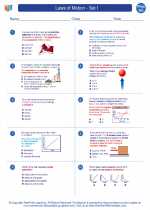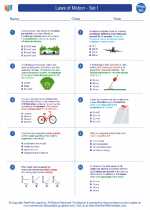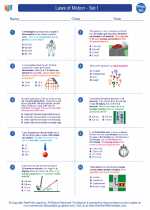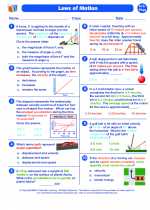Time
Time is a fundamental concept in physics and is often described as the fourth dimension. It is a measurable quantity that allows us to sequence events, compare the durations of events and the intervals between them, and quantify the speed of objects. In physics, time is considered to be a scalar quantity and is typically measured in seconds.
Key Concepts
- Units of Time: The SI unit for time is the second (s).
- Measuring Time: Time can be measured using various instruments such as clocks, stopwatches, and atomic clocks.
- Time Interval: The difference between two time points is known as the time interval.
- Relativity: According to the theory of relativity, time is not absolute and can be perceived differently depending on the observer's frame of reference.
- Time Dilation: Time dilation is the phenomenon where time appears to pass more slowly in strong gravitational fields or when approaching the speed of light.
- Space-Time: In the theory of general relativity, time is combined with three dimensions of space to form a single four-dimensional continuum known as space-time.
Equations
The following equations are commonly used in the study of time:
- Time Interval: Δt = t2 - t1
- Speed: v = d/t
- Time Dilation: Δt' = Δt / √(1 - v2/c2)
Study Tips
Here are some tips for studying the concept of time in physics:
- Understand the Basics: Begin by understanding the fundamental definitions and units of time.
- Practice Conversions: Practice converting time between different units (e.g., seconds to minutes, hours to seconds).
- Relativity and Time: Spend time understanding the concept of time dilation and how it relates to the theory of relativity.
- Real-World Examples: Look for real-world examples of time-related phenomena in physics, such as the effects of time dilation in GPS systems.
- Problem-Solving: Practice solving problems involving time, distance, and speed to reinforce your understanding.
[Time] Related Worksheets and Study Guides:
.◂Physics Worksheets and Study Guides High School. Laws of Motion - Set I
Worksheet/Answer key Laws of Motion - Set I
Laws of Motion - Set I  Worksheet/Answer key
Worksheet/Answer key Laws of Motion - Set I
Laws of Motion - Set I  Worksheet/Answer key
Worksheet/Answer key Laws of Motion - Set I
Laws of Motion - Set I  Worksheet/Answer key
Worksheet/Answer key Laws of Motion - Set I
Laws of Motion - Set I 

 Worksheet/Answer key
Worksheet/Answer key
 Worksheet/Answer key
Worksheet/Answer key
 Worksheet/Answer key
Worksheet/Answer key

The resources above cover the following skills:
PHYSICAL SCIENCE (NGSS)
Energy
Students who demonstrate understanding can:
Develop and use models to illustrate that energy at the macroscopic scale can be accounted for as either motions of particles or energy stored in fields.